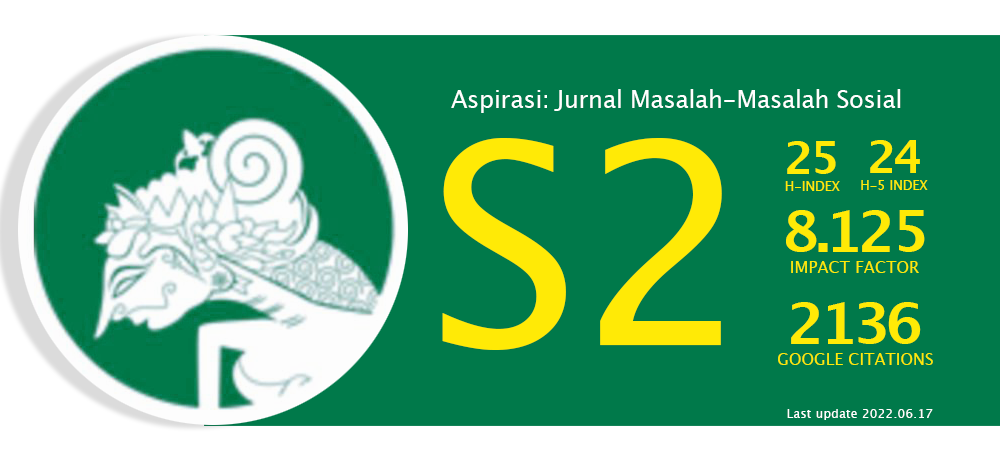MENGATASI PERILAKU KONTRAPRODUKTIF APARATUR NEGARA MELALUI SISTEM REMUNERASI (SEBUAH REVIEW MENGENAI KEADILAN ORGANISASI)
Abstract
Keywords
Full Text:
UntitledReferences
Jurnal
Cropanzano, Russell, Bowen, David E., Gililland, Stephen W. 2007. “The Management of Organizational Justice.” Academy of Management Perspective.Vol. 21, No. 1. 34-48.
Dewi, Avela. 2009. “Pegawai Negeri dan Revitalisasi Nilai-Nilai Etika Dalam Pelayanan Publik.” Civil Service Jurnal Kebijakan dan Manajemen PNS. Vol. 3, No. 2,hlm. 43-54.
Fahrani, Novi Savarianti. 2011. “Penetapan Job Grading dalam Pemberian Remunerasi Kepada PNS.”Civil Service Jurnal Kebijakan dan Manajemen PNS Vol. 5, No. 1, Juni 2011 (Jakarta: Pusat Pengkajian dan Penelitian Kepegawaian Badan Kepegawaian Negara), hlm. 79-90.
Kumorotomo, Wahyudi. 2011.“Tunjangan Kinerja Daerah (TKD) dan Upaya Peningkatan Kinerja Pegawai: Kasus Di Provinsi Gorontalo dan Provinsi DKI Jakarta.” Civil Service Jurnal Kebijakan dan Manajemen PNS.Vol. 5, No. 1, hlm.21-34.
Purwanto. 2011. “Fenomena Tunjangan Berbasis Kinerja Dalam Perspektif Kesejahteraan Pegawai Negeri Sipil.” Civil Service Jurnal Kebijakan dan Manajemen PNS. Vol. 5, No. 1, hlm. 47-56.
Rakhmawanto, Ajib. 2012. “Strategi Perbaikan Penghasilan PNS: Meningkatkan Kompetensi dan Profesionalitas.” Civil Service Jurnal Kebijakan dan Manajemen PNS. Vol 6, No 2. hlm. 13-23.
Subagyo, Agus. 2009. “Reformasi Sistem Rekrutmen Pegawai Negeri di Korea Selatan: Belajar Sistem Meritrokrasi Dari Negeri Ginseng.” Civil Service Jurnal Kebijakan dan Manajemen PNS. Vol. 3, No.2, hlm. 9-20
Suryanto. 2012. “Kompetensi dan Kinerja (Produktivitas) Pegawai Negeri Sipil.” Civil Service Jurnal Kebijakan dan Manajemen PNS .Vol 6, No 2, hlm. 96-107.
Tobirin.2008. “Penerapan Etika Moralitas dan Budaya Malu Dalam Mewujudkan Kinerja PNS yang Profesional.” Civil Service Jurnal Kebijakan dan Manajemen PNS.Vol. 2, No. 2, hlm. 53-79.
Internet
Arisman. Penataan Sistem Penerimaan Pegawai Negeri Sipil. http://www.kumham-jakarta.info/downloads/61-penataan-sistem-penerimaanpegawai-negeri-sipil?path=, diakses pada tanggal 2 April 2014.
Awalwiya, Nayla, Yuliantiningsih, Aryuni., Sudrajat, Tedi., Sari, Dessi Perdani Yuris Puspita. 2013.
Kebijakan Remunerasi Pegawai Negeri Sipil (Analisis Materi Muatan Penentuan Nilai dan Kelas Jabatan Dalam Pemberian Remunerasi). http://www.fh.unsoed.ac.id/index.php/JDH/article/ viewFile/204/152, diakses pada tanggal 2 April 2014.
Bab 2: Prioritas Nasional dan Prioritas Nasional Lainnya. www.bappenas.go.id/get-file-server/node/10450/, diakses pada tanggal 4 April 2013.
Fox, Suzy, Spector, Paul. E., Miles, Don. 2001. Counterproductive Work Behavior (CWB) in Response to Job Stressors and Organizational Justice: Some Mediator and Moderator Test For Autonomy and Emotions. http://www.rc.usf.edu/jdorio/Articles/CWB%20in%20response%20to%20job%20 stressors%20and%20org%20justice.pdf, diakses pada tanggal 2 April 2014.
http://www.kamusbesar.com/32890/remunerasi, diakses pada tanggal 2 April 2014.
http://www.learnersdictionary.com/definition/remuneration, diakses pada tanggal 2 April 2014.
Menpan: Butuh Rp250 T Untuk Remunerasi. http://www.beritasatu.com/makro/33065-menpan-butuhrp-250-t-untuk-remunerasi-pns.html. diakses pada tanggal 4 April 2014
Mulya Firdausy, Carunia. Birokrasi Hambat Kemajuan Ekonomi dan Peneliti. http://www.ristek.go.id/index.php/module/News+News/id/14319, diakses pada tanggal 2 April 2014.
Progress Remunerasi Tahun 2014. http://simkeu.unej.ac.id/progress-remunerasi-tahun-2014/, diakses pada tanggal 2 April 2014.
Rahmawati. 2010. Memperbaiki Citra Negatif Birokrasi Indonesia. http://ejurnal.fisip-untirta.ac.id/index.php/JAP/article/view/53/45, diakses pada tanggal 2 April 2014.
Remunerasi PNS Bakal Pakai Skema Baru: Belanja Pegawai Bengkak, APBN Terancam Jebol. http://www.jpnn.com/read/2013/09/15/191019/Remunerasi-PNS-Bakal-Pakai-Skema-Baru-,diakses pada tanggal 4 April 2014.
Rusli, Budiman. Kebijakan Remunerasi Berbasis Kinerja. http://pustaka.unpad.ac.id/wp-content/ uploads/2013/10/pustaka_unpad_kebijakan_remunerasi_berbasis_kinerja.pdf, diakses pada tanggal 2 April 2014.
Sultani. Potret Buram Profesionalitas Birokrasi. http://www.unisosdem.org/article_detail.php?aid=7732 &coid=3&caid=31&gid=2, diakses pada tanggal 2 April 2014.
Peraturan Perundang-Undangan
Peraturan Menteri Pendayagunaan Aparatur Negara dan Reformasi Birokrasi Nomor 34 Tahun 2011 Tentang Pedoman Evaluasi Jabatan.
Peraturan Pemerintah No. 7 Tahun 1977 Tentang Peraturan Gaji Pegawai Negeri Sipil.
Peraturan Pemerintah No. 46 Tahun 2011 Tentang Penilaian Prestasi Kerja Pegawai Negeri Sipil.
Peraturan Presiden No. 81 Tahun 2010 Tentang Grand Design Reformasi Birokrasi.
Undang-Undang No. 43 Tahun 1999 Tentang Perubahan Atas Undang-Undang No. 8 Tahun 1974 Tentang Pokok-Pokok Kepegawaian.
Undang-Undang No. 5 Tahun 2014 Tentang Aparatur Sipil Negara.
DOI: https://doi.org/10.46807/aspirasi.v5i1.451
Refbacks
- There are currently no refbacks.







